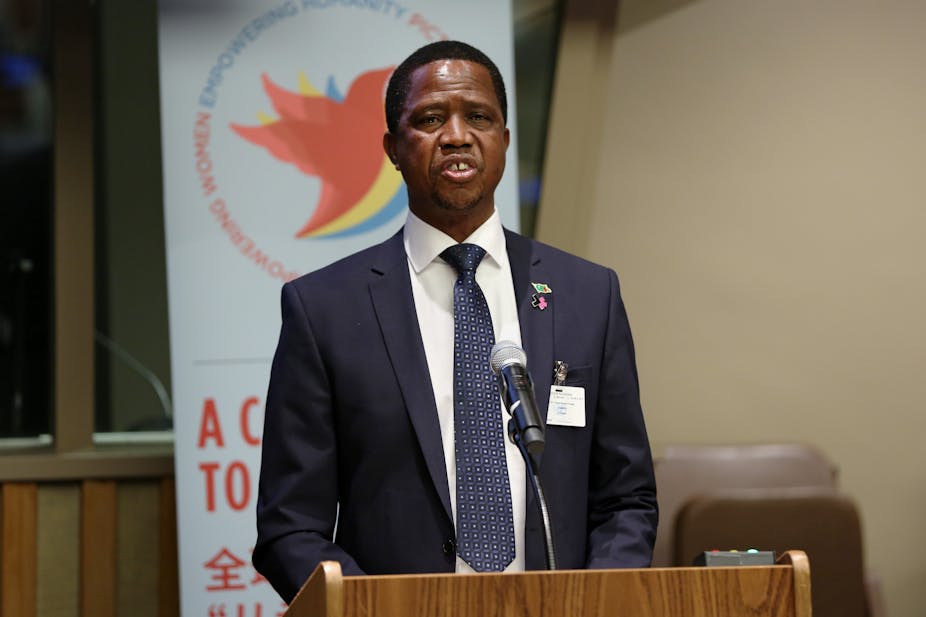The speaker of the Zambian National Assembly, Patrick Matibini, has suspended 48 opposition legislators for 30 days as a punishment for unauthorised absence from the parliament. Their offence? To have been missing for President Edgar Lungu’s state of the nation address in March.
The suspension of the MPs does not come as a great surprise. Hardliners from the ruling Patriotic Front have been pushing for something along these lines for some time. The ruling party was quick to try and disassociate itself from the Speaker’s actions. But, as Zambian commentators have pointed out, the action fits into a broader web of measures designed to intimidate those who question the president’s authority.
The most significant was the arrest of opposition leader Hakainde Hichilema, who remains in jail on trumped up treason charges.
While the latest development in Zambia’s growing political crisis doesn’t come as a shock, it will disappoint those who were hoping that Lungu would be persuaded to moderate his position. Instead, it appears that the International Monetary Fund’s decision to go ahead with a bail out package despite the government’s democratic failings has emboldened the president to pursue an authoritarian strategy.
As a result, a swift resolution to the current political standoff seems unlikely.
Roots of the crisis
For some time Zambia was considered to be one of the more competitive democracies in Africa. But a period of backsliding under Lungu has raised concerns that the country’s inclusive political culture is under threat. The current impasse stems from the controversial elections in 2016 when Lungu won a narrow victory that remains contested by the opposition United Party for National Development.
Hichilema, the leader of the United Party for National Development, has stated that his party will not recognise the legitimacy of Lungu’s victory until its electoral petition against the results is heard in court. The initial petition was rejected by the Constitutional Court. But its decision was made in a way that had all the hallmarks of a whitewash. The UPND subsequently appealed to the High Court. Hichilema’s decision to make his party’s recognition of the president conditional on the petition being heard was designed both as an act of defiance, and as a means to prevent the government from simply sweeping electoral complaints under the carpet.
Until the court case is resolved, the opposition is committed to publicly challenging the president’s mandate by doing things like boycotting his addresses to parliament. In response, members of the ruling party have accused the United Party for National Development of disrespect and failing to recognise the government’s authority. It is this that appears to lie behind Hichilema’s arrest on treason charges.
Punishing parliamentarians
The suspension of United Party for National Development legislators needs to be understood against this increasingly authoritarian backdrop. It is one of a number of steps taken by those aligned to the government that are clearly designed to intimidate people who don’t fall into line. Other strategies include public condemnation of the government’s critics and proposals to break-up the influential Law Society of Zambia.
Efforts by the president’s spokesman to disassociate the regime from the suspensions have been unpersuasive. The official line of the ruling party is that the speaker of parliament is an independent figure and that he made the decision on the basis of the official rules. It’s true that the speaker and the parliamentary committee on privileges, absences and support services have the right to reprimand legislators for being absent without permission.
Nonetheless the argument is disingenuous for two reasons. The speaker is known to be close to the ruling party, a fact that prompted Hichilema to call for his resignation earlier this year. And the committee’s decisions are clearly driven by the Patriotic Front because it has more members from it than any other party.
The claim that the suspension was not government-led lacks credibility. This is clear from the fact that Patriotic Front MPS have been the most vocal in calling for action to be taken against boycotting United Party for National Development MPs.
IMF lifeline for Lungu
There are different perspectives on the crisis in Zambia. Some people invoke the country’ history of more open government to argue that Lungu will moderate his position once the government feels that the opposition has been placed on the back foot. Others identify a worrying authoritarian trajectory that began under the presidency of the late Michael Sata. They conclude that things are likely to get worse before they get better.
One of the factors that opposition leaders hoped might persuade President Lungu to release Hichilema and move discussions back from the police cell to the negotiating chamber was the government’s desperate need for an economic bail out. Following a period of bad luck and bad governance, Zambia faces a debt crisis. Without the assistance of international partners, the government is likely to go bankrupt. This would increase public dissatisfaction with the Patriotic Front and undermine Lungu’s hopes of securing a third term.
But the willingness of the IMF to move towards the completion of a $1.2 billion rescue package suggests that authoritarian backsliding is no barrier to international economic assistance. In turn, IMF support appears to have emboldened the government to continue its efforts to intimidate its opponents.
IMF officials, of course, will point out that they are not supposed to take political conditions into account and that their aim is to create a stronger economy that will benefit all Zambians. This may be true, but the reality is that by saving the Lungu government financially the IMF is also aiding it politically. Whatever its motivation, the agreement will be interpreted by many on the ground as tacit support for the Patriotic Front regime, strengthening Lungu’s increasingly authoritarian position.

